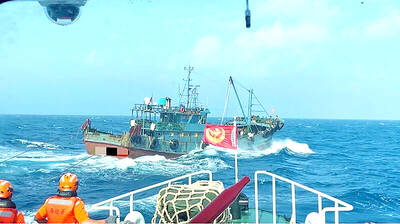A pair of legislative committees passed draft regulations yesterday that would allow gambling on Taiwan's offshore islands such as Kinmen and Penghu.
In addition, changes to "The Offshore Islands Development Act" would allow all Taiwanese to travel to China through offshore islands.
Currently, under the "small three links," only residents of the Kinmen and Matsu island groups may travel to China.
Lawmakers say the revisions to the Act would help stimulate the economies of the nation's offshore islands.
The draft changes were passed by the Finance and the Home and Nations committees.
Chen Ching-pao (陳清寶) and Lin Pin-kuan (林炳坤), KMT legislators from Kinmen and Penghu, were among the lawmakers advocating the revisions yesterday.
In Chen's proposal, the decision whether to legalize gambling would be left up to a majority vote of an island's residents. A decision to abolish gambling could be achieved in the same manner.
The lawmaker's plan also envisions casino operators paying 10 percent of their gross to an island's local government and "offshore construction funds." In addition, at least 50 percent of a casino's employees would have to be local hires.
But not everyone was satisfied with yesterday's proposal.
Su Tzen-ping (蘇正平), director of the Government Information Office, said he regretted the legislative committees' move, as the Cabinet was planning a similar measure.
"Executive departments are evaluating and establishing a proposal for the legalization of gambling on offshore islands," Su said. "We hope that the Legislative Yuan can wait for the executive departments' proposal."
Proposals to introduce casinos to Taiwan's offshore islands have been controversial. At the end of last year, the Development and Evaluation Commission said it was evaluating the possibility of legalizing gambling on off-shore islands.
In March, Minister of the Interior Chang Po-ya (張博雅) said that she and President Chen Shui-bian (陳水扁) agreed that casinos should be allowed on offshore islands.
Those remarks sparked heated debate among environmentalists, scholars and religious leaders about whether the government should roll the dice on legalized gambling.
But gambling isn't seen as the sole way to solve the economic problems of the nation's offshore islands.
Some hope tourists bound for China could give the islands a much-needed boost.
Lin Chung-cheng (林忠正) said yesterday that anyone from Taiwan should be allowed to travel to China through an island participating in the "small three links." Currently, just residents of the Kinmen and Matsu island groups may go.
Lin said making the change would help Taiwanese reduce transportation costs, in addition to stimulating the economies of off-shore islands.
Chen agreed that the revision would be beneficial. "The main purpose of implementing the small three links was so that goods and Taiwanese travelers would pass through the offshore islands instead of Hong Kong and Macau," Chen said. "But the Cabinet has been conservative" in allowing a greater flow of goods and tourists, Chen said.

The Republic of China (ROC) is celebrating its 114th Double Ten National Day today, featuring military parades and a variety of performances and speeches in front of the Presidential Office in Taipei. The Taiwan Taiko Association opened the celebrations with a 100-drummer performance, including young percussionists. As per tradition, an air force Mirage 2000 fighter jet flew over the Presidential Office as a part of the performance. The Honor Guards of the ROC and its marching band also heralded in a military parade. Students from Taichung's Shin Min High School then followed with a colorful performance using floral imagery to represent Taiwan's alternate name

COGNITIVE WARFARE: Chinese fishing boats transmitting fake identification signals are meant to test Taiwan’s responses to different kinds of perceived incursions, a report said Chinese vessels are transmitting fake signals in Taiwan’s waters as a form of cognitive warfare, testing Taipei’s responses to various types of incursions, a report by the Institute for the Study of War said on Friday. Several Chinese fishing vessels transmitted fake automatic identification system (AIS) signals in Taiwan’s waters last month, with one mimicking a Russian warship and another impersonating a Chinese law enforcement vessel, the report said. Citing data from Starboard Maritime Intelligence, the report said that throughout August and last month, the Chinese fishing boat Minshiyu 06718 (閩獅漁06718) sailed through the Taiwan Strait while intermittently transmitting its own AIS

CHINESE INFILTRATION: Medical logistics is a lifeline during wartime and the reported CCP links of a major logistics company present a national security threat, an expert said The government would bolster its security check system to prevent China from infiltrating the nation’s medical cold chain, a national security official said yesterday. The official, who wished to stay anonymous, made the remarks after the Chinese-language magazine Mirror Media (鏡周刊) reported that Pharma Logistics (嘉里醫藥物流) is in charge of the medical logistics of about half of the nation’s major hospitals, including National Taiwan University Hospital and Taipei Veterans General Hospital. The company’s parent, Kerry TJ Logistics Co (嘉里大榮物流), is associated with the National Committee of the Chinese People’s Political Consultative Conference (CPPCC) and the Chinese People’s Liberation Army (PLA), the

COVETED PRIZE: The US president would be a peace prize laureate should he persuade Xi Jinping to abandon military aggression against Taiwan, William Lai said US President Donald Trump should get the Nobel Peace Prize should he be able to convince Chinese President Xi Jinping (習近平) to abandon the use of force against Taiwan, President William Lai (賴清德) told a conservative US radio show and podcast in an interview. The US is Taiwan’s most important international backer, despite the absence of formal ties, but since Trump took office earlier this year he has not announced any new arms sales to the nation. Trump could meet Xi at the APEC summit in South Korea on Oct. 31 and Nov. 1. Lai, speaking on The Clay Travis and Buck Sexton